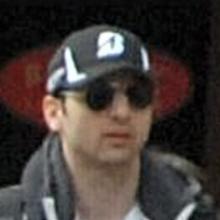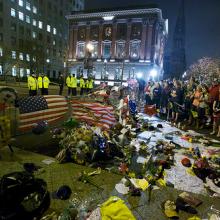tsarnaev
After deliberating for 14 hours over the course of three days, a Boston jury of seven women and five men sentenced Dzhokhar Tsarnaev, 21, to death.
The jury found Tsarnaev did not show remorse for his actions, and they rejected the defense argument that Tsarnaev was brainwashed by his older brother, Tamerlan, who was killed by police shortly after the bombing.
Sister Helen Prejean, the Catholic nun and anti-death penalty activist whose story came to fame with the 1995 film Dead Man Walking, took the stand on May 11 in the penalty phase of convicted Boston Marathon bomber Dzhokhar Tsarnaev’s trial. She said he is “genuinely sorry for what he did,” and told her how he felt about the suffering he caused to the bombing’s victims.
“He said it emphatically,” Prejean said.
“He said no one deserves to suffer like they did.”
An undisclosed community on Wednesday accepted the body of Boston bombing suspect Tamerlan Tsarnaev, which is now “entombed,” according to police in Worcester, Mass.
Tsarnaev’s uncle, Ruslan Tsarni, found a funeral home in Worcester to handle the body, but had struggled to get a cemetery to accept it. The Boston Globe reported that the body is buried in a community outside Massachusetts.
“As a result of our public appeal for help, a courageous and compassionate individual came forward to provide the assistance needed to properly bury the deceased,” read a statement posted on the Worcester Police Department’s website.
When I got off the plane at O’Hare Airport in Chicago on my way home to Boston on April 15, I couldn’t believe my eyes. Televisions blaring everywhere showed my beloved city at her premier event of the year, the Boston Marathon. Everyone knows the rest of the story.
“Is this for real? How can this be?” I asked, unable at first to face the reality of what had occurred. Feelings of fear and anger followed quickly on the heels of the denial.
Leaders responded quickly: the mayor, the governor, the president. “Any responsible individuals, any responsible groups will feel the full weight of justice,” promised President Barack Obama.
What is justice? Vengeful words immediately spewed from talk shows and bloggers’ keyboards. “We must catch them alive and make them suffer as much as possible. That will pay them back for what they did,” spewed those who equate justice with revenge.
Of course, violence begets more violence. Gandhi put it succinctly: “An eye for an eye makes the whole world blind.” Paul exhorted the Romans, “Repay no one evil for evil, but take thought for what is noble in the sight of all. . . Beloved, never avenge yourselves, but leave it to God, for it is written, ‘Vengeance is mine, I will repay,’ says the Lord. (Romans 12:17,19.)”
In the wake of the Boston Marathon bombings that left three dead and more than 260 injured, perhaps none face more significant adjustments or a longer road ahead than the 14 amputees who lost a limb.
For these victims, the path forward involves relearning almost everything, from getting out of bed to getting in a car. Whether they go on to lead satisfying lives depends largely on how they handle the spiritual challenges at hand, according to amputees and researchers.
Losing a limb is like losing a family member: It involves grief and mourning, according to Jack Richmond, a Chattanooga, Tenn., amputee who leads education efforts for the Manassas, Va.-based Amputee Coalition. When one’s body and abilities are radically changed, questions of meaning are suddenly urgent: Why did this happen? Why am I here?
“You’re wondering: Why did I live?” said Rose Bissonnette, an amputee and founder of the Lancaster, Mass.-based New England Amputee Association, a support organization for amputees.
Editor’s Note: Jim Wallis’ latest book On God’s Side: What Religion Forgets and Politics Hasn’t Learned About Serving the Common Good is sparking a national conversation on what it means to come together on issues that traditionally divide the nation. Bloggers Adam Ericksen and Tripp Hudgins are having that conversation here, on the God’s Politics blog. Follow along, and join the discussion in the comments section.
What if we surprised our enemies?
I mean, really surprised them. What if we surprised them with something totally unexpected? When our personal, political, and national enemies strike us, they expect us to strike back. That’s been the human script since the foundations of human culture. We mimic violence blow for blow. Only each side wants to be the side who delivers the final blow.
What if we surprised our enemies and changed the script?
CAMBRIDGE, Mass. — After two troubling outbursts at a local mosque, leaders there told Boston Marathon bombing suspect Tamerlan Tsarnaev he would no longer be welcome if he continued disrupting services.
Leaders at the Islamic Society of Boston‘s mosque in Cambridge say Tsarnaev, 26, who died early Friday after a shootout with police, “disagreed with the moderate American-Islamic theology” of the mosque, but they never had “any hint” the brothers might be violent.
On one occasion in November at weekly prayer, Tsarnaev challenged an imam who said in his sermon that it was appropriate to celebrate U.S. national holidays, such as July 4th and Thanksgiving, the statement said.
Tsarnaev argued that such celebrations are “not allowed in the faith.” When the preacher met with Tsarnaev after the prayer, Tsarnaev “repeatedly argued his viewpoint, and then left,” the statement said.






